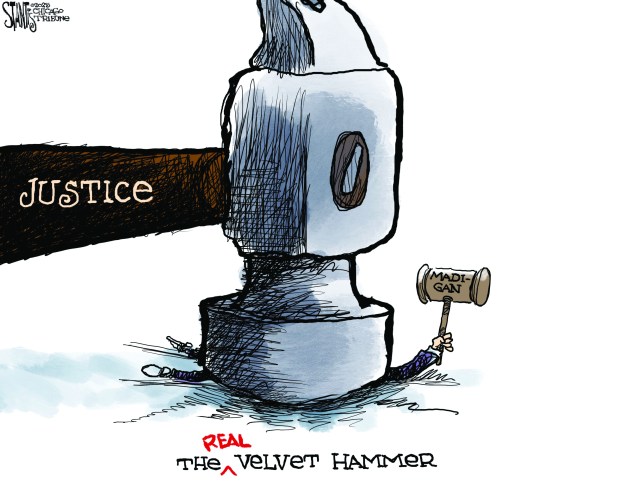In the end, U.S. District Judge John Robert Blakey chose to send a stern message with his 7.5-year prison sentence of Michael J. Madigan, former speaker of the Illinois House of Representatives.
Madigan — for decades the most powerful politician in Illinois, the state that gave this nation its greatest president — will have to spend more than six years of that term at a minimum under federal rules, even assuming good behavior. The former Illinois House speaker is 83, so the likelihood of his dying while in confinement is considerable. A human tragedy is self-evident.
But that doesn’t make Blakey’s sentence unjust.
Madigan admitted no wrongdoing in his own short statement before the judge handed down the sentence. The closest he came was saying, “I’m not perfect.” We wonder whether there was a legal strategy behind such obstinance given near-certain appeals of the verdict as to how federal law was applied to Madigan’s conduct. A tactical reasoning may have been behind Madigan’s rejection of the courtroom contrition that might otherwise have trimmed his sentence. We’ll find out in due course.
Speaking of the 16th president of the United States, Blakey referenced Abraham Lincoln before he sentenced Madigan: “It’s really hard to be Honest Abe right? He’s a unicorn in our American history. Being great is hard. But being honest is not. Being honest is actually very easy. It’s hard to commit crimes.”
And the evidence showed that Madigan did indeed work hard in hatching and executing the schemes that a jury of Madigan’s peers concluded were felonies.
The justice behind this sentence reflects how Madigan ran this state for so long, his unprincipled grip on power, and the price we all will pay for many years to come for the financial malpractice he left in his expansive wake. The former House speaker was convicted on multiple corruption-related counts based mainly on his brazenly corrupt dealings with Commonwealth Edison in the 2010s, but there’s little doubt the modus operandi he used to help ComEd and parent Exelon rake in billions from ratepayers was in place for far longer than the eight years on which federal prosecutors focused.
Those eight years were just the period wherein the FBI and the U.S. attorney’s office pressured former Ald. Danny Solis to wear a wire and capture damning interactions with Madigan (and powerhouse Ald. Edward Burke, who is serving time as we write) and tapped the cellphone of Madigan confidant and right-hand man Michael McClain, for years ComEd’s lead outside lobbyist. Even people inside ComEd would refer to McClain as a “double agent,” serving Madigan as much or more than the company that was paying him. McClain was caught on wiretaps saying that Madigan was his one, true client.
The corruption caught on those intercepted calls and in a few videos taken by cooperating co-conspirators was just as ugly as those who battled Madigan politically (and usually lost) and those who criticized his stranglehold on state government (such as this page) always had imagined it would be.
The plotting. The fixation on rewarding political soldiers with no-work arrangements. The frequent demands on a compromised and beholden company to perform the patronage function local government used to provide before courts put the kibosh on the practice. The public was made privy to all.
And who paid to keep the Madigan machine running? Anyone paying taxes. Anyone paying an electric bill. That is, just about everyone in this state.
Judge Blakey’s agreement with prosecutors that Madigan lied when he took the witness stand in his own defense suggested there would be no mercy forthcoming. Blakey even went so far as to call Madigan’s lies “a nauseating display.”
We marveled in January, witnessing Madigan’s testimony, how he depicted McClain as just one friend among a sizable coterie of loyalists when anyone who’d sat through Madigan’s trial (and the 2023 “ComEd Four” trial in which McClain was convicted) knew full well that McClain and Madigan were extremely close.
Madigan had a strategic reason to distance himself from his supremely loyal friend, who evidence showed acted as Madigan’s agent in his dealings with ComEd and others in Springfield, even the Democratic lawmakers who typically followed Madigan’s orders. Once he was convicted, Madigan’s betrayal of McClain served to exacerbate his crimes in the judge’s eyes.
After a jury convicted Madigan in February on 10 of 23 counts (on the remainder he was acquitted or jurors couldn’t agree), we held out hope that the former speaker’s downfall would spell the end of corruption on the scale that he practiced in Illinois. We still hold fast to that hope and belief, while of course acknowledging that graft and corruption, albeit on a less ambitious scale always will be a part of our politics and governance as long as human nature exists.
But this prison sentence should serve as a clear deterrent for any future political Svengali wanting to follow in Madigan’s footsteps.
Michael J. Madigan had myriad political skills, as a parade of governors whom he watched come and go all would attest. To the very end, Madigan ran the playbook of his mentor, Mayor Richard J. Daley, written in an era when the Democratic machine was the accepted way of political life in Chicago and Illinois.
We feel sorry for Madigan and his family. But we applaud this firm and final repudiation of the “Velvet Hammer’s” brand of politics.
Submit a letter, of no more than 400 words, to the editor here or email letters@chicagotribune.com.



